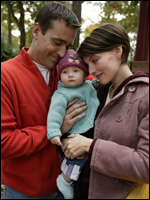CDC Features
Current Features
Rubella: Make Sure Your Child Is Fully Immunized
One of the best ways to protect children from vaccine-preventable diseases is to vaccinate them on time. Check your child's medical records to see whether he or she has already received the MMR vaccine (for measles, mumps, and rubella).

Rubella is often called "German measles," although it is not really measles and is caused by a different virus called Rubivirus. Like measles, rubella also causes a rash, which is fainter than the measles rash and lasts 2 or 3 days. A person with rubella might also have a slight fever and feel general discomfort. However about 50% of persons who have rubella do not have any symptoms.
Rubella is especially dangerous for pregnant women. If a woman gets rubella during pregnancy, especially during the early stages of pregnancy, it can lead to fetal death, premature delivery, and congenital rubella syndrome (CRS), serious birth defects—which may include deafness, cataracts, heart defects, mental retardation, or liver and spleen damage. During an epidemic of rubella in 1964–1965 in the United States there were about 12.5 million cases of rubella and 20,000 cases of congenital rubella syndrome (CRS) leading to more than 11,250 fetal deaths, 2,100 neonatal deaths, 11,600 babies born deaf, 3,580 babies born blind and 1,800 babies born mentally retarded.
Rubella can be prevented by immunization. The vaccine against rubella was licensed in 1969, and after that, the number of cases in the United States declined rapidly. Today, because so many people are vaccinated, rubella is no longer endemic and cases of rubella are rare in the United States. However, rubella can be brought into the United States at any time by worldwide travelers from countries where the disease is still present. Outbreaks can occur in groups of susceptible individuals who are not immunized. Two rubella outbreaks occurred in 1990-1991 in California and Pennsylvania and resulted in the birth of 58 infants with CRS. The best way to protect children and adults from this serious disease is to maintain high immunization levels.
The Best Protection Against Rubella – the MMR Vaccine
The rubella vaccine is usually administered as MMR, a combination vaccine that provides protection against three viral diseases, measles, mumps, and rubella. The MMR vaccine is strongly endorsed by medical and public health experts as safe and effective. Two doses are recommended for children—the first dose at 12 to 15 months of age, and the second dose before entering school at 4 to 6 years old.
Any unvaccinated woman who might become pregnant should be vaccinated unless a blood test shows she is immune to rubella.
See If Your Child's MMR Vaccine Is Due
• Check your child's immunization record,
• Contact their healthcare provider, or
• Visit the immunization scheduler for newborn to 6-year-old children.

Paying for the MMR Vaccine
Health insurance usually covers all or most of the cost of the MMR vaccine. Children 18 years and younger may be eligible to get free vaccines through the Vaccines for Children (VFC) program. To find out more about the VFC program, contact your state VFC Coordinator. To learn more about the VFC program, visit the VFC Web site or ask your child's healthcare provider.
Some Adults Need MMR Vaccine Too!
Complications from rubella are not common, but they tend to occur more often in adults than children and may include encephalitis (brain infection), pain and/or swelling of the joints in women, and pain and or swelling of the testicles.
Anyone born during or after 1957 who has not had rubella or has not been vaccinated should receive one dose of MMR vaccine. Any unvaccinated woman who might become pregnant should be vaccinated unless a blood test shows she is immune to rubella.
More information and resources on MMR vaccination and other vaccinations for persons 0-18
- To learn more about rubella, MMR vaccine, or other childhood vaccines, visit Rubella Vaccination or What Parents Need to Know
- Measles, Mumps and Rubella Vaccines: What You Need to Know (Vaccine Information Statement) (English (
 2 pages, 43 KB) or other languages*
2 pages, 43 KB) or other languages* - Infants and Toddlers vaccine topics
- Pre-teens and Adolescents vaccine topics
- For information in Spanish, visit Immunización
- Additional articles in the Childhood Immunization Series: Hepatitis B vaccine, Measles, Mumps
Page last updated: January 7, 2008
Content source: National Center for Immunization and Respiratory Diseases
Content owner: National Center for Health Marketing
URL for this page: www.cdc.gov/Features/Rubella/
*Links to non-federal organizations are provided solely as a service to our users. These links do not constitute an endorsement of these organizations or their programs by CDC or the federal government, and none should be inferred. CDC is not responsible for the content of the individual organization Web pages found at these links.


